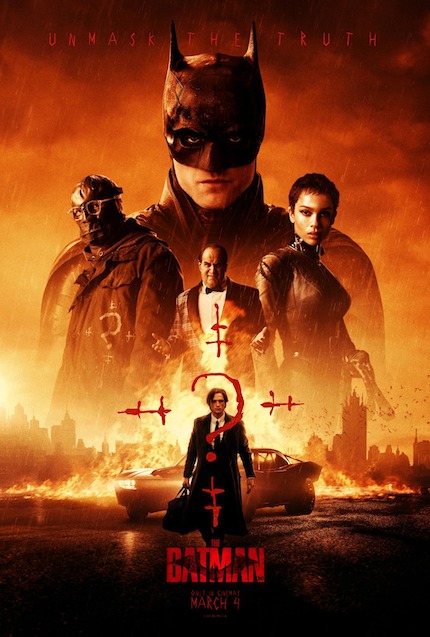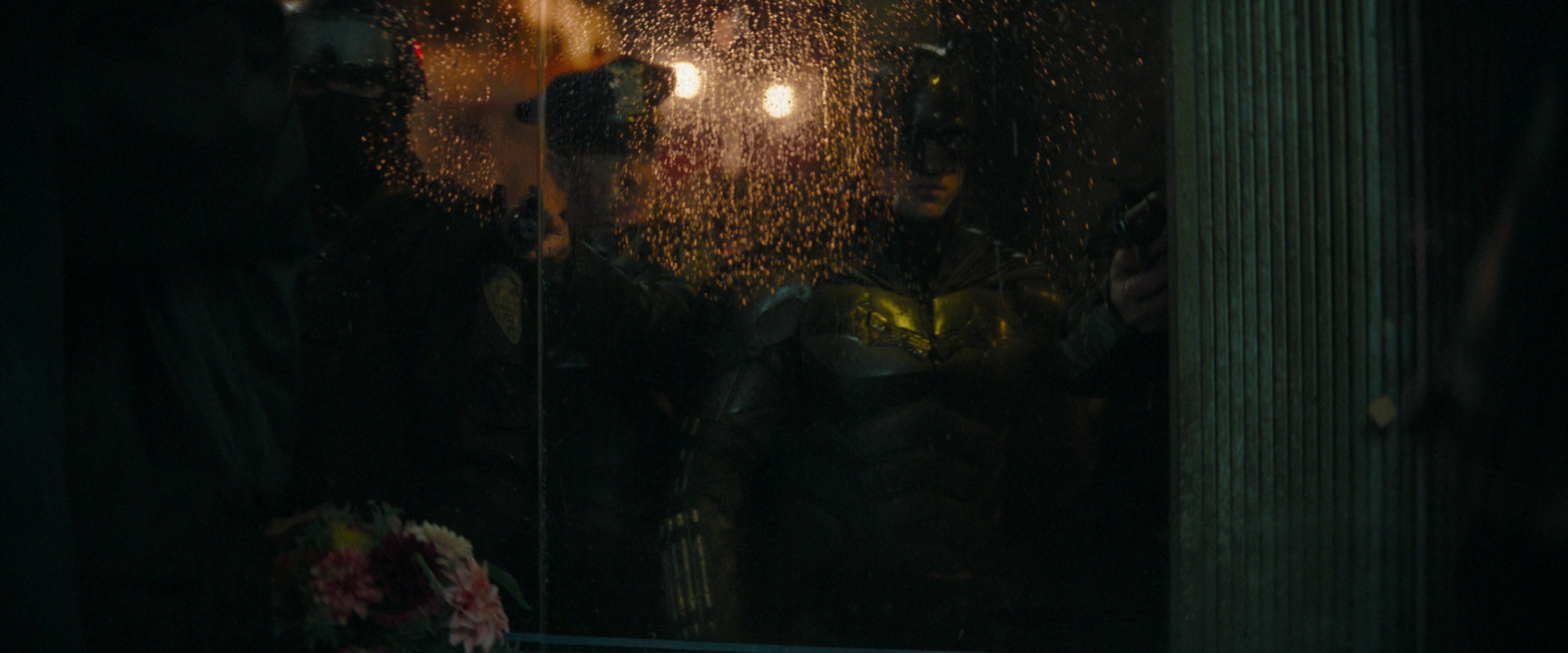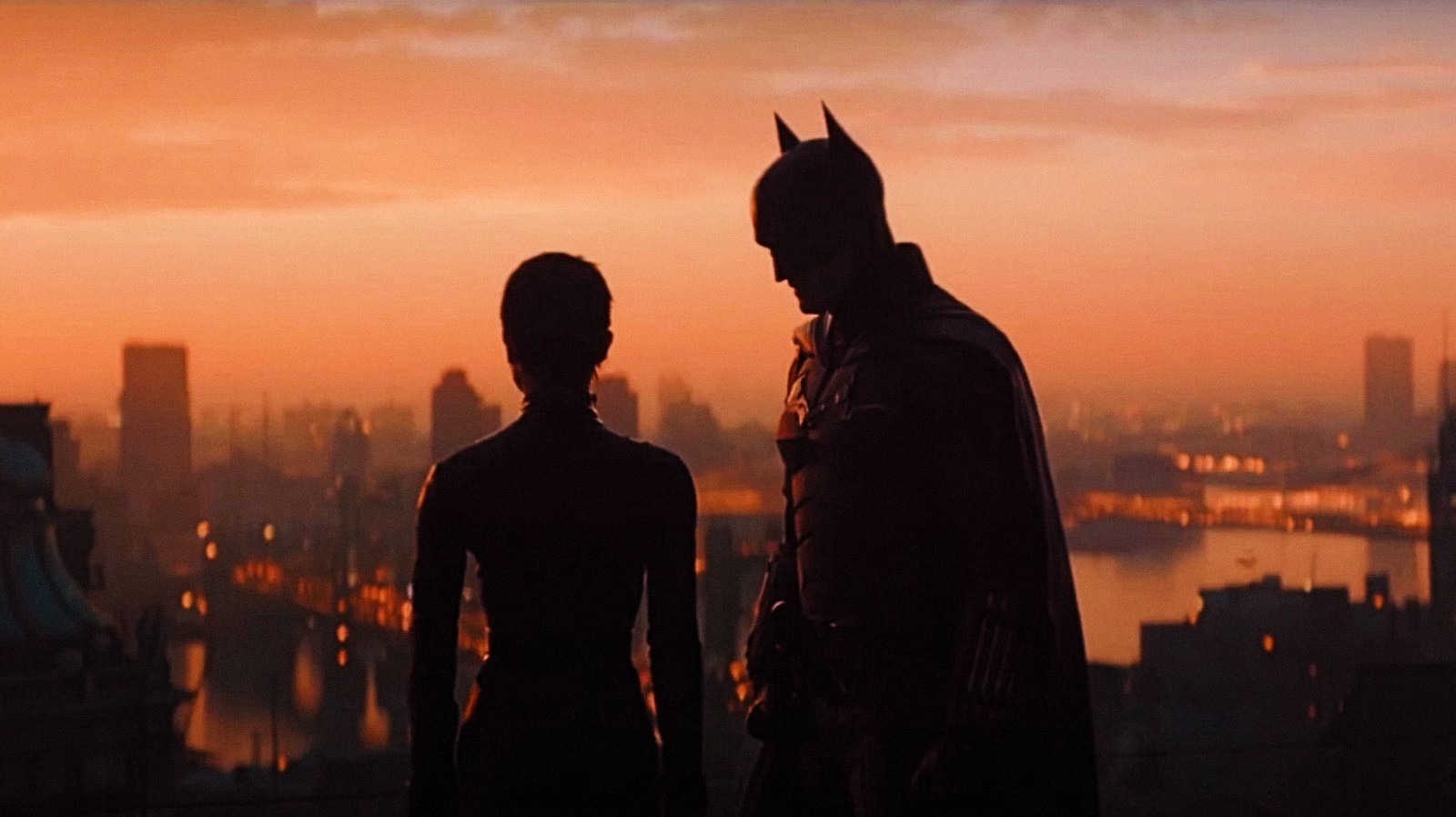Review: THE BATMAN, Bleak, Noir-Inflicted Vision, Perfect for Our Times
Robert Pattinson and Zoe Kravitz star in a dark, epic adventure, directed by Matt Reeves.

Marvel/Disney may have won the spandexed superhero wars, but that hasn’t stopped its chief rival, DC/Warner Bros., missing more often than it hit, at least in the last, lost decade.
Not even an abortive superhero universe, the fan-dubbed "Snyderverse," was enough to dampen Warner Bros.’s executives from green lighting yet another standalone Batman film, first with writer-director-actor Ben Affleck as in-Snyderverse Batman and his alter-ego, Bruce Wayne and then, after Affleck’s departure, under writer-director Matt Reeves (Let Me In, Cloverfield), a well-respected genre specialist who didn’t just help to revitalize one, big-screen series, War For the Planet of the Apes, Dawn of the Planet of the Apes, he elevated them beyond any reasonable expectation to the status of commercial art.
Reeves’s The Batman similarly succeeds, combining big-budget thrills with thoughtful, provocative ideas about the nature of vigilantism, social and political inequality, and human nature.
From the first shot of an offscreen voyeur watching an upper-middle-class family celebrating Halloween, Reeves pulls the audience away from the action tropes that his predecessor, Christopher Nolan, adopted more than a decade and a half ago: It’s far from the exhilarating, action-oriented, operatic beginning of The Dark Knight (a bank heist orchestrated by an anarchic supervillain) or The Dark Knight Rises (a mid-air rescue of an apocalyptic cult leader), instead choosing a supremely discomfiting scene involving home invasion and murder by The Batman’s central villain, Edward Nashton/The Riddler (Paul Dano), a puzzle-obsessed, mask-wearing serial killer in a green camo jacket and an agenda to destabilize a corrupt Gotham riven by crime, violence, and economic inequality by targeting the city’s elite in politics, law enforcement, and the courts.
Borrowing voiceover narration, another noir trope, Reeves’ gives us a disquieting peek into Bruce Wayne/Batman’s mind and it’s almost as disturbing and unstable as the Riddler’s. Defined, as always, by foundational family trauma, the loss of his parents as a preteen, Wayne has spent the better part of two years running around Gotham as a costumed vigilante.
Even as Batman’s nocturnal presence has created background fear in the city’s low-level criminals, it’s clear that Wayne-as-Batman uses the beatdowns he inflicts on Gotham’s underclass less out of altruism than as a means to exorcise his sadomasochistic impulses. Not surprisingly, the police see Batman as an interloper, a “freak” who hinders law enforcement’s attempts to keep Gotham safe from crime.
There’s one exception, of course, and it’s Lt. James Gordon (Jeffrey Wright), a GCPD officer who sees Batman as a potential ally, calling him to crime scenes via Bat-Signal, including the murder that opens The Batman and sets Batman on the obligatory journey from a marginal, costumed crimefighter to the mythic superhero who protects Gotham’s poorest and least entitled. It’s a long journey, though, and this iteration of Wayne, bitter, angry, despondent, isn’t likely to endear moviegoers to him.
He wears his emotional wounds on the surface, choosing to hide inside the Gothic mansion he nominally calls home rather than engage the real world, an attitude that puts him in constant conflict with his legal guardian, mentor, and yes, butler, Alfred Pennyworth (Andy Serkis).
The Riddler functions both as Batman’s traditional foe, the enemy Batman has to vanquish to restore the social order before the end credits roll, and a catalyst for Batman’s transformation into a social justice warrior (of sorts), using Wayne’s inherited billions to help Gotham’s most deserving and least represented, exchanging the first scene’s sense of hopelessness and despair, an invisible machine grinding everyone except the city’s elite’s into dust, with one, eventually, reflecting, if not hope exactly, then at least the promise of hope for both Batman, aided by Gordon and Selina Kyle/Catwoman (Zoe Kravitz), an orphan like Wayne, but unlike Wayne, born into poverty and crime. She has a decidedly different, though not entirely contrasting view of Gotham and the elites who run it.
Though Reeves follows not atypical romantic tropes in the Batman-Catwoman scenes, it’s just as clear that Catwoman represents something more than a romantic object for Batman, someone else for Batman to care for beyond himself and his emotional damage: She represents the life not lived, a life without the social, cultural, and economic opportunities available to Wayne regardless of the loss of his parents. As such, she gives both Batman and The Batman something it badly needs, an empathetic heart that would otherwise make this iteration of Batman unredeemable.
And, of course, there’s the overarching murder-mystery heavily influenced by Se7en, Zodiac, and even Saw film-wise and Batman: Year One, The Long Halloween, and its direct sequels comic book-wise, that drives The Batman. Though predictable in some parts and unpredictable in others, bringing fan-favorite villains like Oscar Cobblepot/The Penguin (Colin Ferrel, unrecognizable under mountains of latex), an ambitious mid-level mobster, and Carmine Falcone (John Turturro), Gotham’s most powerful mobster.
The murder-mystery plot might contain The Batman’s weakest elements, on occasion threatening to undermine Reeves’s obvious ambitions for a reimagined Batman and a reimagined Gotham, but despite a few slow, languid spots here and there (especially in the second half), those elements rarely slip into boredom or banality.
As Bruce Wayne/Batman, Robert Pattinson has the Master Brooder/Emo vibe cornered, sometimes to a frightening degree, but that’s at best a superficial reading of Pattinson’s performance. More than any of his predecessors under the cape and cowl, Pattinson brings a level of emotional openness and emotional vulnerability that makes him instantly sympathetic.
Even when he’s engaging in the hand-to-hand combat typical of a non-powered superhero, every crunching blow hits doubly hard both the characters onscreen and Batman’s wounded psyche. In time, Pattinson’s performance might be just considered the definitive interpretation of Wayne/Batman, though, as always, every generation gets the Bruce Wayne/Batman they deserve, if not always need.
The Batman opens Friday, March 4 in movie theaters worldwide.











